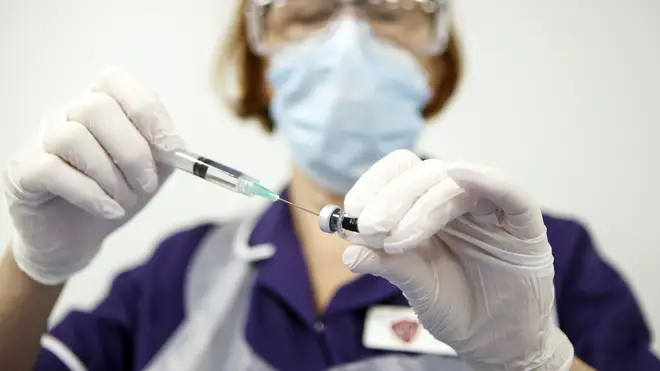
Clive Bull 1am - 4am
1 January 2021, 13:57 | Updated: 1 January 2021, 15:21

Covid-19 vaccine shortages are likely to be a "reality" in the first part of 2021, Professor Chris Whitty has warned, amid fears emergency staff at "battle stations" could be at risk of burnout.
The nation was offered a glimmer of hope in the last month of 2020, as two vaccines were approved for use in the fight against the virus which has so far claimed more than 73,000 lives in the UK alone.
The UK has already ordered 100 million doses of the Oxford-AstraZeneca jab - which begins being rolled out on Monday - which is enough to fully inoculate 50 million people.
A further 30 million doses of the Pfizer vaccine have also been ordered.
Read more: Delaying second Covid vaccine doses 'will save lives' - UK's chief medical officers
But there are warnings a shortage could slow down the number of people being vaccinated as the world works to manufacture the vaccines.
In a joint letter signed by Professor Whitty and the chief medical officers for Scotland, Wales and Northern Ireland warned the possibility of vaccine shortages is a "reality which cannot be wished away".


"We have to ensure that we maximise the number of eligible people who receive the vaccine," it read.
Read more: Expert explains strategy behind second Covid jab cancellations
"Currently the main barrier to this is vaccine availability, a global issue, and this will remain the case for several months and, importantly, through the critical winter period.
"Vaccine shortage is a reality that cannot be wished away."
In a press conference last weeks, deputy chief medical officer Jonathan Van Tam said efforts to produce the vaccine could be made harder by a shortage of "fill and finish" materials needed to speed up the roll out across the country.
Read more: David Davis - Chris Whitty's vaccine delay 'is unwise - and not the first unwise judgement'

Vaccination and immunisation deputy explains reasoning behind one dose strategy
He said: "Many of you know already that it's not just about vaccine manufacture. It's about fill and finish, which is a critically short resource across the globe."
Each person who gets vaccinated will need two doses for the drug to be fully effective, and it was decided earlier this week that the priority will be for as many people as possible to get their first jab - which the second one being administered up to 12 weeks later.
It is hoped the decision will maximise the number of people receiving some protection from coronavirus, rather than fully protecting fewer people in that same period of time.

People arguing against limiting social contact 'have blood on their hands'
In a joint statement, the CMOs said pushing back people's follow-up jabs is "much more preferable" as the first dose offers "substantial" protection.
But as the number of people in hospital with Covid-19 pass those seen in the April peak, a senior medic has warned emergency healthcare staff at "battle stations" are at risk of burnout.
Adrian Boyle, vice president of the Royal College of Emergency Medicine, said people were "tired, frustrated and fed-up", while Saffron Cordery, deputy chief executive of NHS Providers, said the next few weeks would be "nail-bitingly difficult for the NHS".
Dr Boyle told BBC Breakfast: "What is it going to be like over the next couple of months? I don't know, I am worried.
"We are very much at battle stations.
Read more: London hospital in 'disaster medicine mode' as cases keep rising
Read more: London council leaders urge Williamson to reverse school openings
"There will be short-term surges of morale but people are tired, frustrated and fed-up, as everybody is, whether they work in hospital or not.
"The people who go into emergency medicine expect it to be tough from time to time.
"There is a real worry about burnout."
New Year's Eve brought a new record high of 55,892 daily lab-confirmed cases in the UK - the highest since mass testing began in late May - with a further 964 deaths within 28 days of a positive test.
A British Medical Association (BMA) survey also found that 67% of doctors reported that current levels of fatigue and exhaustion were higher than normal as they

David Davis critical of Chris Whitty's decision-making
But the decision has been met with criticism by former Brexit Secretary David Davis said the decision to delay giving people their second coronavirus vaccine jabs is an "unwise judgement" from Prof Whitty.
He told LBC's Iain Dale on Friday: "This is a way of mitigating that. I think it's a bad idea," later arguing that an answer would be to "put more resource into it and go faster."
The Conservative MP then went on to say he understood the chief medical officer's reasoning, but added that he thought there would be some "concern" from GPs administering the vaccine.